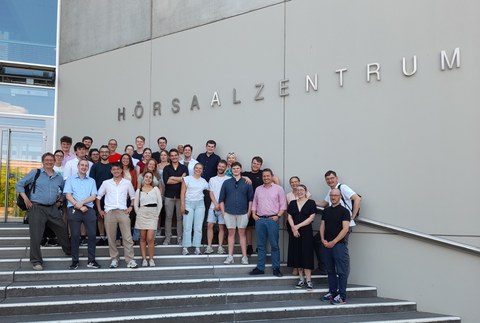05.03.2024
Horizonte erweitern und Europa näher zusammenbringen: Die Organisation der ersten EUTOPIA-Summer School in Dresden im Podcast

Die Teilnehmer:innen und Dozent:innen der EUTOPIA Summer School „Histories of Violence“ vor dem Hörsaalzentrum der TU Dresden.
Gewalt ist ein vielschichtiges Phänomen, das in den unterschiedlichsten, auf den ersten Blick unzusammenhängenden Kontexten auftritt. Ob als staatliche Gewalt in kolonialen Praktiken und politischen Diskursen oder auf der eher persönlichen Ebene von Gewalt im Zusammenhang mit Alkoholkonsum – es gibt einen roten Faden, der sich durch alle Erscheinungsformen zieht und es Forschenden ermöglicht, Gewalt als ein breites Thema über Zeit und Raum hinweg zu analysieren.
Um dies tiefergehend zu untersuchen und interdisziplinäre Zugänge zu gewinnen, fand vom 2. bis 8. Juli 2023 die EUTOPIA Summer School zur Geschichte der Gewalt statt. Organisiert von der TU Dresden in Zusammenarbeit mit der University of Warwick, war sie die erste Summer School der EUTOPIA-Initiative in Dresden und richtete sich in erster Linie an Studierende im fortgeschrittenen Grundstudium. Mit 26 studentischen Teilnehmer:innen von sieben europäischen Universitäten hat die Summer School auch gezeigt, dass die Nachfrage nach einer solchen Lern- und Austauschplattform hoch ist.
In der neuesten Folge des Podcasts On.Line.Dates vom Team Digitale Lehre des Bereichs Geistes- und Sozialwissenschaften der TU Dresden sprechen zwei der Organisator:innen der Summer School, Dr. Johannes Schütz und Wiebke Voigt, über ihre Erfahrungen mit der Organisation von und der Teilnahme an der Summer School. Dr. Johannes Schütz, wissenschaftlicher Mitarbeiter am Lehrstuhl für Neuere und Neueste Geschichte, reflektiert über den Nutzen und die Notwendigkeit solcher Plattformen. Die Summer School sieht er dabei als Alternative oder Ergänzung zum Erasmus-Programm. Wiebke Voigt, wissenschaftliche Mitarbeiterin im Bereich der frühneuzeitlichen Geschichte, ergänzt, dass die Summer School gerade für britische Studierende eine willkommene Ergänzung ist, denn diese haben aufgrund des Austritts Großbritanniens aus der EU nicht mehr die Möglichkeit, am Erasmus-Programm teilzunehmen. Außerdem bietet sie den Studierenden die Möglichkeit, das eigentliche wissenschaftliche Arbeiten und Forschen in der Praxis hautnah zu erleben.
Da es sich um die erste Sommerschule der EUTOPIA-Initiative in Dresden handelte, hatten die Organisator:innen die Freiheit, Struktur und Ausrichtung des Programms kreativ zu gestalten. Das bedeutete aber auch, dass sie die zusätzliche Verantwortung hatten, Systeme und logistische Abläufe im Projektmanagement zu schaffen, die auf einer „Trial-and-Error“-Basis erprobt werden mussten. So konnten die Organisator:innen ein wertvolles Modell für künftige EUTOPIA-Summer Schools schaffen und geben anderen die Möglichkeit, von ihren Erfahrungen zu profitieren.
Bei der Reflexion über Höhepunkte und Elemente, die unbedingt wiederholt werden sollten, um den Erfolg künftiger EUTOPIA-Summer Schools zu gewährleisten, unterstreichen beide Organisator:innen die Intensität des Formats. Die Möglichkeit, sich eine ganze Woche lang intensiv mit einem Thema zu beschäftigen und mit Menschen unterschiedlicher Lebens- und Wissenschaftsbereiche zu diskutieren, schafft ein Umfeld, das so reich an vielfältigen persönlichen und beruflichen Erfahrungen ist, wie sonst nur selten möglich. Dr. Johannes Schütz fasst es wie folgt zusammen: „Ich könnte das, glaube ich, in einen Begriff bringen und der deckt alles ab: das ist eine Horizonterweiterung“. Außerdem schätzt Wiebke Voigt den persönlichen, informellen Austausch und die Möglichkeit, andere Städte in Europa kennenzulernen, die sich bei den Exkursionen und an gemeinsamen Abenden ergeben. Ergänzend dazu erklärt Dr. Johannes Schütz, dass insbesondere im Rahmen eines jährlichen Programms, bei dem jede EUTOPIA-Universität abwechselnd den Gastgeberstatus der Summer School innehat, eine gewisse „europäische Atmosphäre“ entsteht und Verbindungen geknüpft werden, die Europa näher zusammenrücken lassen, was ja auch die Kernidee der EUTOPIA-Initiative ist: ein europaweiter Campus.
Im ausführlichen Gespräch mit Moderator Benjamin Lehmann erzählen die beiden Vertrer:innen des Organisationsteams mehr über die verschiedenen Veranstaltungsformate ihrer Summer School, verraten, was sie im Prozess gelernt haben, und stellen sich vor, wie EUTOPIA in zehn Jahren aussehen könnte. Die ganze Folge ist auf Spotify und bei Apple Podcasts verfügbar sowie direkt auf der Website des Podcasts. Dort finden sich auch das Transkript und dessen englische Übersetzung.
Kontakt:
Dr. Johannes Schütz
Professur für Neuere und Neueste Geschichte
Email:
Tel.: +49 351 463 39716
Wiebke Voigt
Professur für Geschichte der Frühen Neuzeit
Email:
Tel.: +49 351 463-43847
